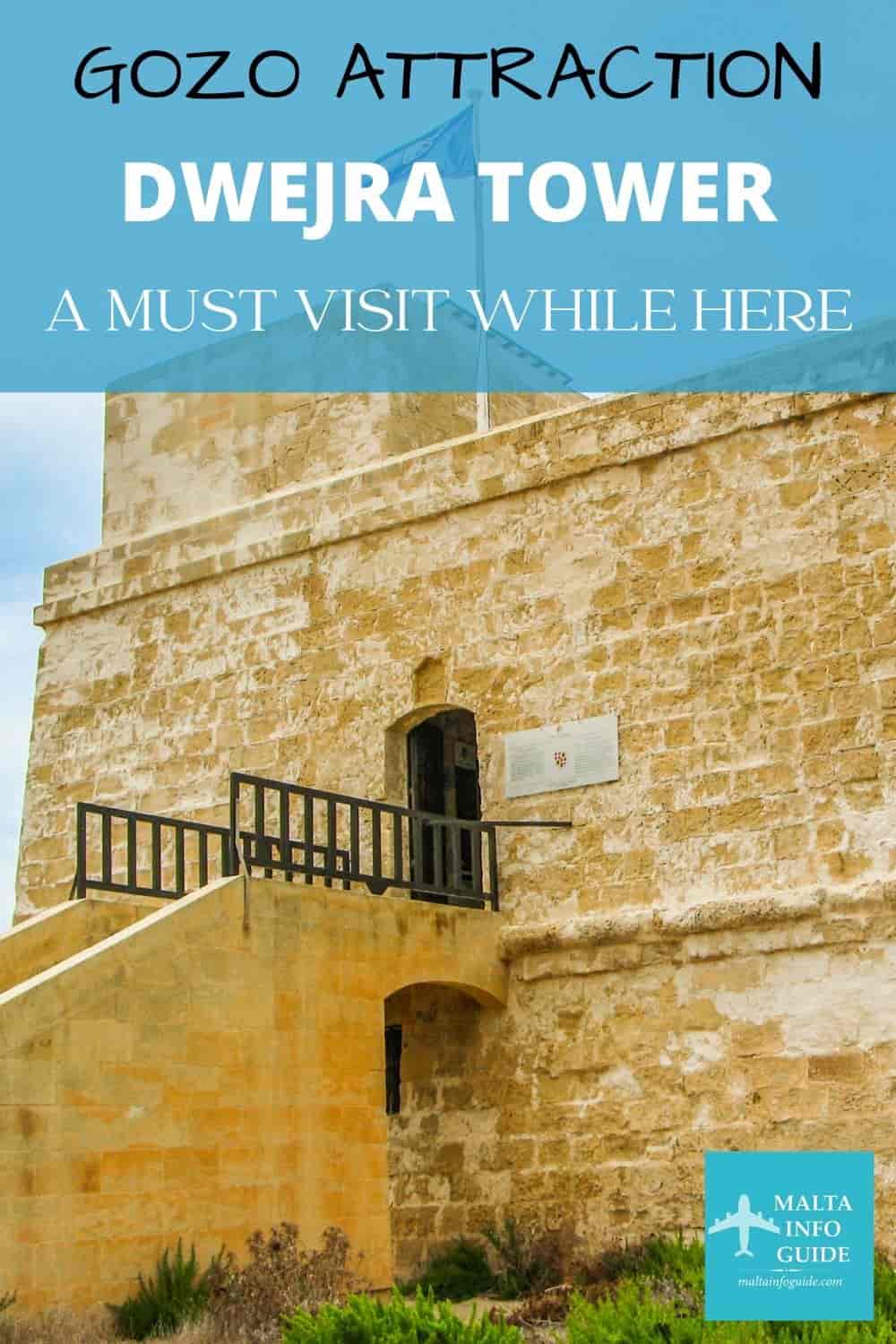- Home
- Gozo Island
- Dwejra Tower
Dwejra Tower gozo
Exploring the Iconic Dwejra Tower's 350-Year Story
The Dwejra Tower, also known as Qawra Tower or "Il-Ġebla tal-Ġeneral" in Maltese, was built in 1652 during the magistracy of Grand Master Giovanni Paolo Lascaris (1636 – 1657), guarding the western flank of Gozo. It was funded by the Gozo Municipality which also provided it with guns and ammunition.
It is located within the Dwejra Heritage Park, leading out of the village of San Lawrenz, down a winding public road. As you approach you will have a glimpse of all the landmarks within the Heritage Park such as the tower itself, Fungus Rock, Inland Sea and the terrain surrounding. Since the tower was built on high grounds, it will most probably be the first thing you will see.
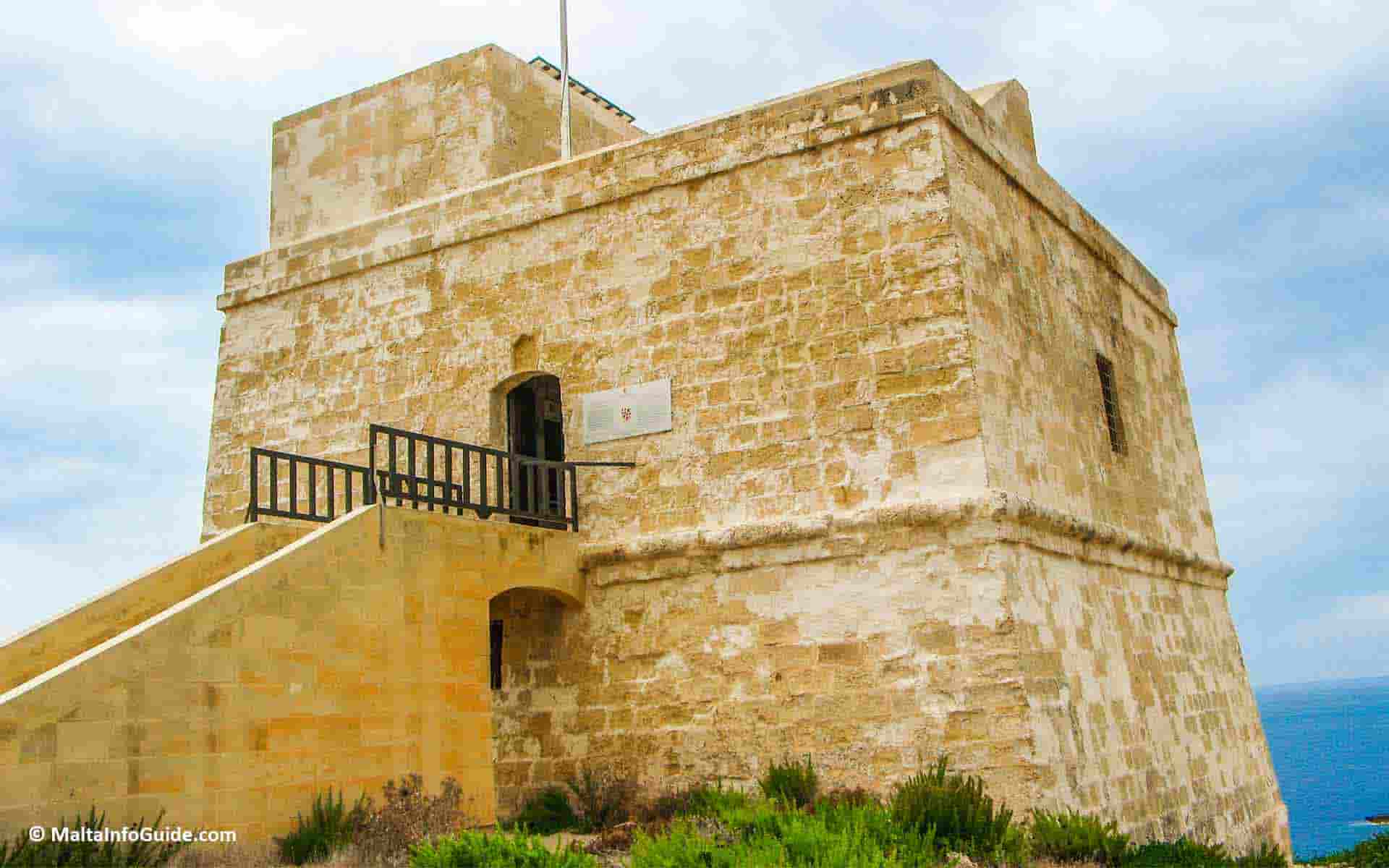 Standing sentinel on Gozo, Malta's rugged coastline, the Dwejra Tower is a historical reminder of the island's defensive past.
Standing sentinel on Gozo, Malta's rugged coastline, the Dwejra Tower is a historical reminder of the island's defensive past.This tower was built to serve as a watchtower to protect the surrounding area from corsair landings, which were a common threat during this period. Later on, it was used to guard the Fungus Rock to prevent unauthorized access to the medicinal plant known as the Malta Fungus.
dwejra tower table of contents
- Dwejra Tower Storyline
- Breathtaking Scenery And Landscapes
- Should You Visit Dwejra Tower?
- Things to do Close by and Around The Island Of Gozo
- Coastal Watch Towers in Malta, Gozo and Comino
- Frequently Asked Questions About Dwejra Tower
In Gozo, it is part of a group of coastal watchtowers that have survived, along with the Xlendi Tower, Marr ix-Xini Tower and Isopu Tower.
Disclaimer: On our website, you will find affiliate links from which we receive a small commission.
7 Epic Things To Do In Malta In 1 Day
Watch the video below to discover the ultimate 24-hour adventure in Malta! It's packed with 7 must-do activities. For more amazing travel tips, be sure to visit our YouTube channel, hit subscribe, and dive into our full collection! (Sound ON 🔊)
For more amazing travel tips, be sure to visit our YouTube channel, hit subscribe, and dive into our full collection!
dwejra tower storyline
The Dwejra tower was completed in 1652 during the reign of Grand Master Jean Paul Lascaris Castellar.
In 1746, Grand Master Manuel Pinto da Fonseca (1741 to 1773), established guards at the tower to guard the Fungus Rock.
Between 1839 and 1873 soldiers from the Royal Malta Fencible Artillery were assigned to the Dwejra watch tower which was equipped with three 6-pounder cannons and two swivel guns. Little is known of what happened afterwards.
In the year 1914, during World War l, Maltese troops from the King’s Own Malta Regiment and the Royal Malta Artillery were allocated to guard the coastline.
During World War 2, the tower was used as an observation post, and the men on watch duty, Captain Frank Debono and Carmelo Zahra, rescued an RAF pilot after he crash-landed his Mark Vb Spitfire on the cliffs of the bay on 27 March 1943.
It has recently been restored in 1998 by Din l-Art Ħelwa a Maltese Heritage Trust and is open regularly. Look for the flag flying when it is open. Further reading about the tower can be done through the Din l-Art Ħelwa website from where one can also see the opening times.
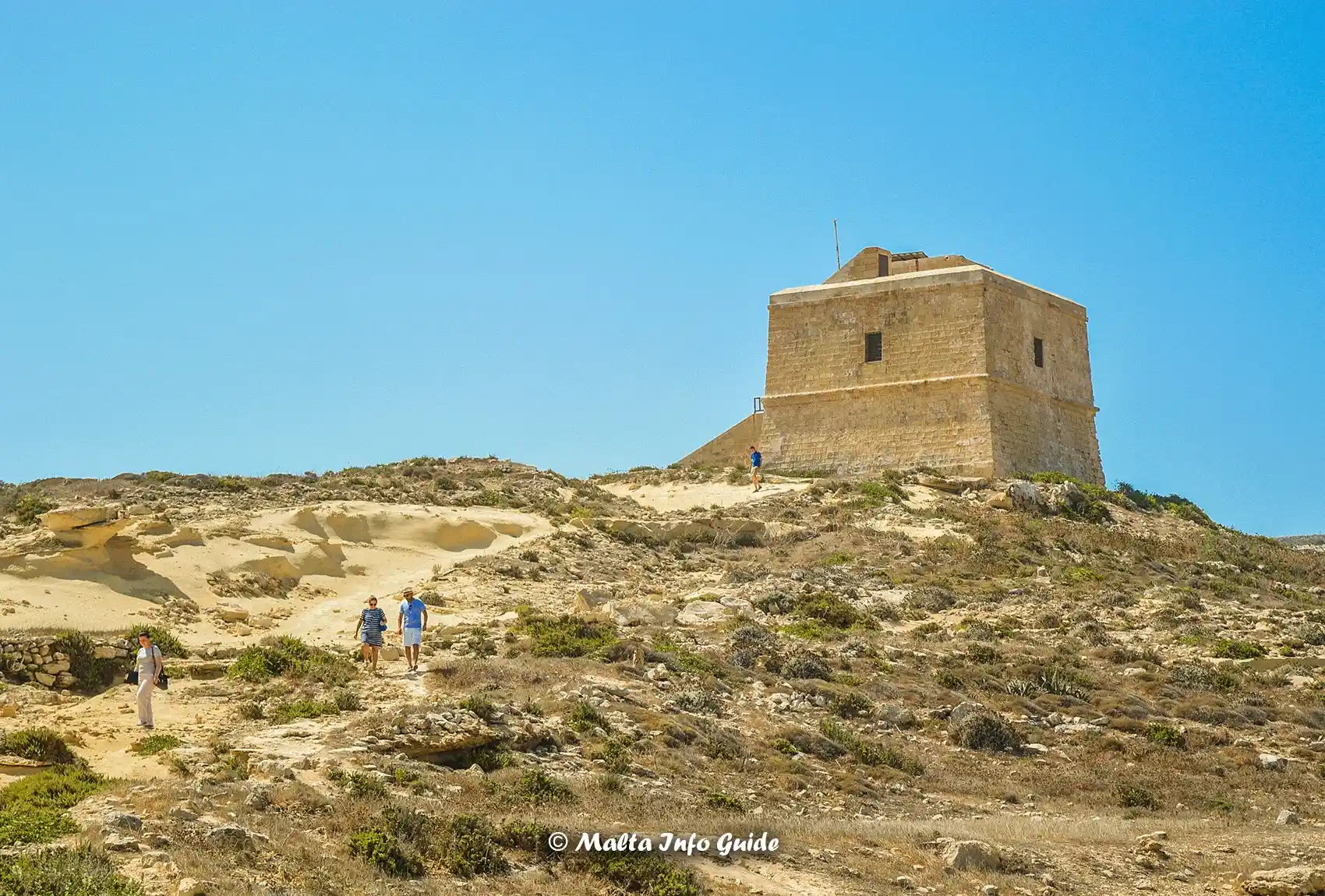 A different angle of the Dwejra Tower at the Dwejra Heritage Park
A different angle of the Dwejra Tower at the Dwejra Heritage ParkDefensive Role in Maltese History
This tower played a crucial role in the early warning system that protected the islands. Exploring this site allows you to step back in time and imagine the life of the guards who watched over these waters centuries ago.
Unique Military Architecture
As a robust example of 17th-century military architecture, Dwejra Tower showcases typical defensive features such as thick limestone walls and strategic turrets. This not only fulfilled a practical defensive purpose but also reflects the architectural style and construction techniques of the period, making it an interesting study for both history buffs and architecture enthusiasts.
Breathtaking Scenery and Landscapes
Located near the famed Azure Window (which unfortunately collapsed in 2017), Dwejra Bay still offers breathtaking natural beauty. The area is known for its dramatic coastal cliffs, deep blue waters, and unique geological features. A visit to Dwejra Tower is often accompanied by exploring these scenic landscapes, ideal for photography and nature walks.
Educational Value: A Rich Learning Opportunity
Visiting Dwejra Tower provides an educational experience for all ages. It’s an excellent opportunity for children and adults alike to learn about historical defence strategies, local geology, and the ecological significance of the area. Informational signs and guided tours can enhance this learning experience, making it not only enjoyable but also informative.
Peaceful Retreat: Escape from the Crowds
Unlike more crowded tourist spots in Malta, Dwejra Tower offers a quieter, more introspective experience. This makes it ideal for those looking to escape the hustle and bustle of busier locations, offering a peaceful setting to reflect on history and nature.
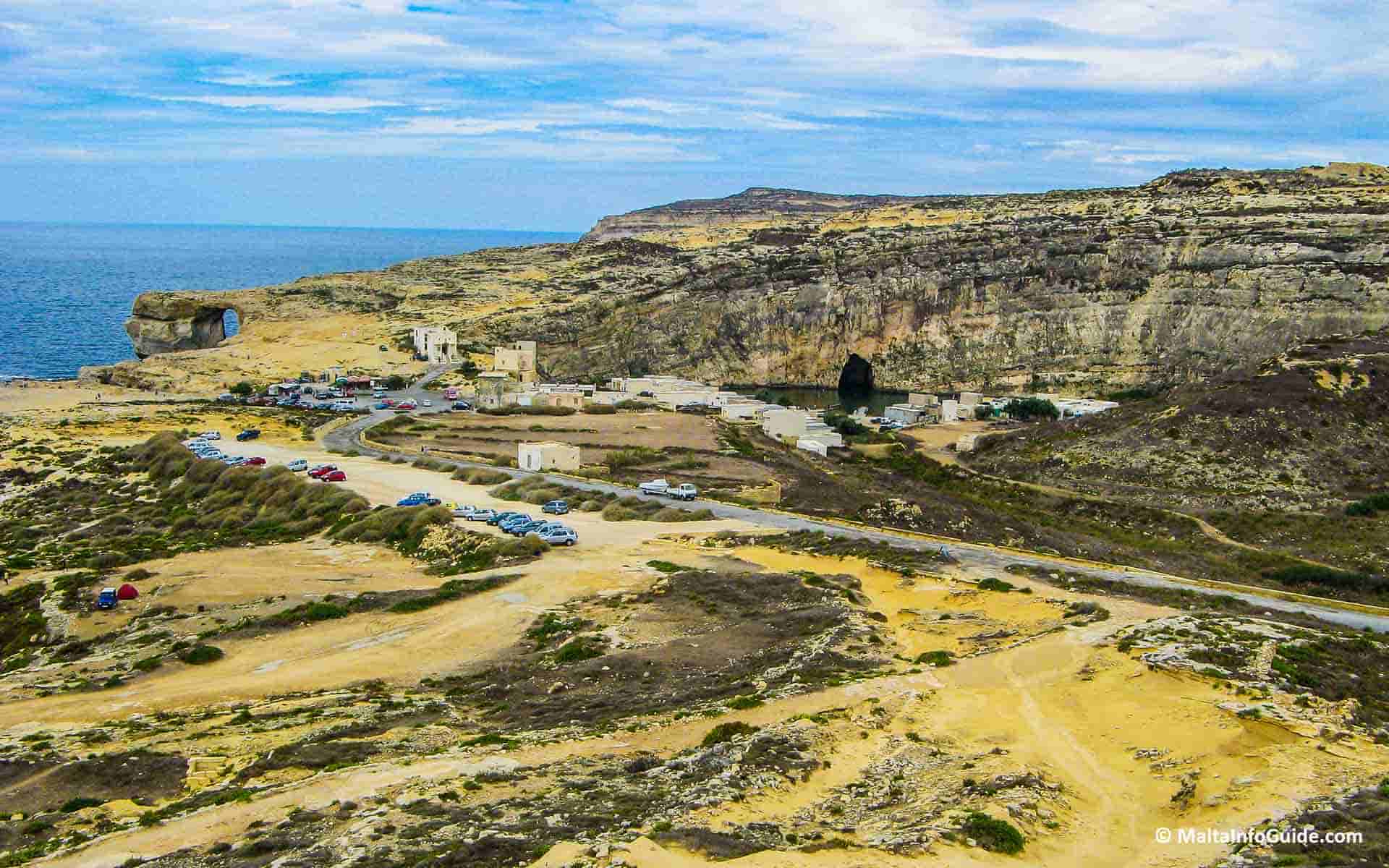 The Azure Window, the Inland Sea and Dwejra Bay are seen from the top of Dwejra Tower in Gozo.
The Azure Window, the Inland Sea and Dwejra Bay are seen from the top of Dwejra Tower in Gozo.Should you visit dwejra tower?
This tower is worth a visit as it offers a spectacular view of the surroundings. A short film has been created about the underwater life in Dwejra which can be seen in the basement of the tower. When visiting this tower there are other things you can do while at Dwejra.
Visiting the Dwejra watchtower isn’t advisable if you have mobility issues. The walk up from the road is fairly steep and there are also several steep steps to get into the tower itself as well as to climb up to the roof.
how to get there
Getting to Dwejra is quite easy. The Dwejra Tower is only 2 minutes away on foot from the bus stop and car parks.
- If you are getting there by car then parking is not a problem. There are three parking areas where to leave your car.
- By public transport, you stop at the 'Dwejra' Bus Stop with the 311 route from Victoria. It is a 25-minute bus ride.
Other ways of how to get to Dwejra by using other transport are here.
things to do close by and around the island of gozo
Discover the captivating history, breathtaking scenery, and abundant marine life of Gozo by engaging in these interesting local activities.
- You can enjoy a quick dip in the deep sea at Dwejra Bay, just five minutes from the tower.
- Don't miss seeing the former Azure Window, a natural arch which sadly collapsed in March 2017 but remains an iconic landmark.
- Inland Sea, is a unique lagoon connected to the Mediterranean Sea by a narrow cave. Take a scenic boat ride to experience the open sea or enjoy a refreshing swim here.
- You can enjoy an ice cream from a colourfully painted local van or stop by a nearby refreshment bar.
- At Blue Hole and Fungus Rock, renowned dive sites offering spectacular underwater experiences, diving enthusiasts will find paradise.
- Consider eating at the local restaurant beside the Inland Sea to experience traditional Gozitan cuisine.
- In Victoria, the ancient Citadel offers panoramic views and a taste of history.
- Marsalforn and Xlendi Bay are ideal for relaxing by the sea.
- The crystal-clear waters of the Blue Lagoon on the island of Comino make it a must-see, and many serene beaches can be found on Gozo's coast.
- Among the oldest freestanding structures in the world, the Ġgantija Temples are a great place to get a taste of prehistoric culture.
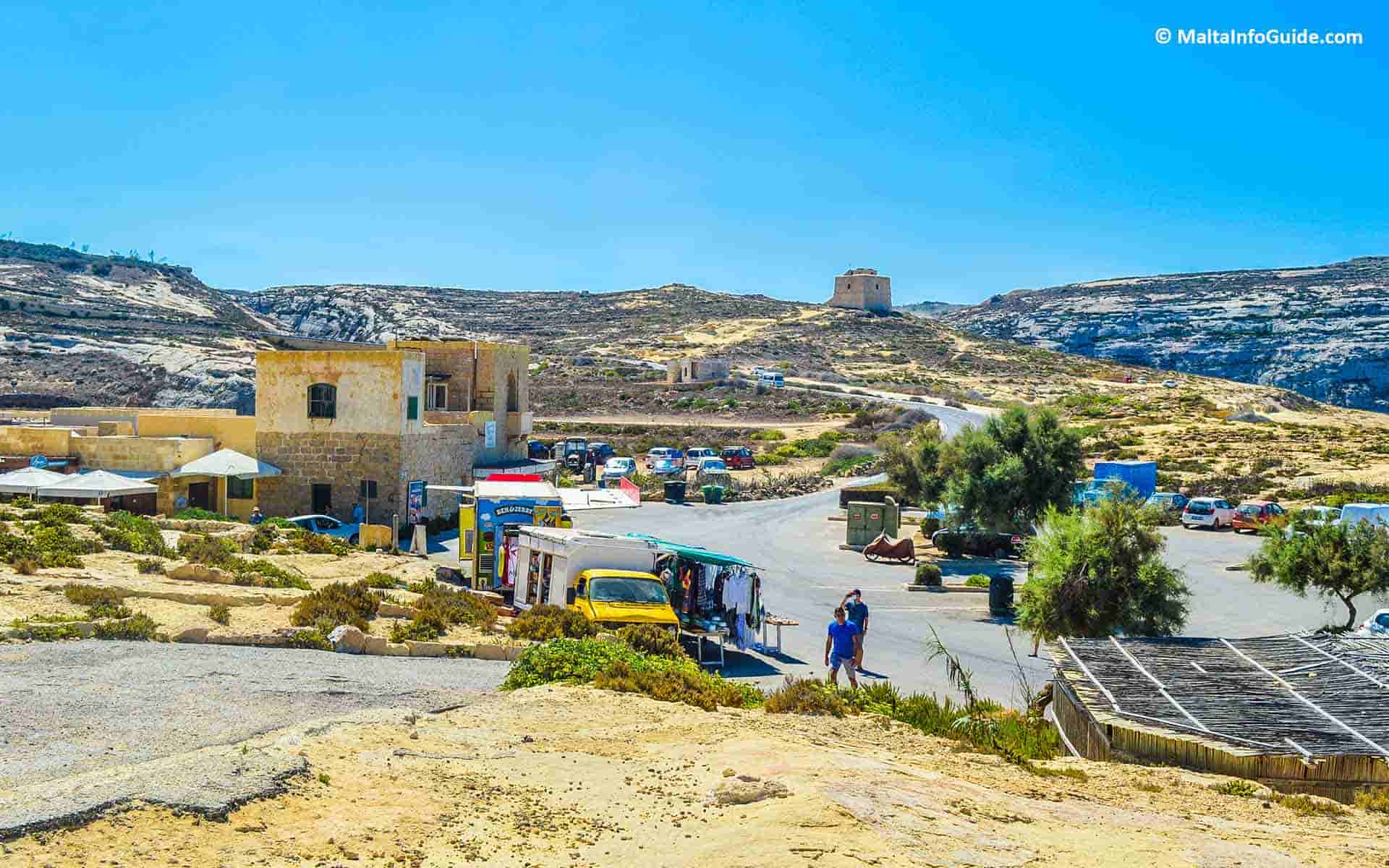 Dwejra car park with the Dwejra Tower on the hill built as a coastal watch tower
Dwejra car park with the Dwejra Tower on the hill built as a coastal watch towerCoastal Watch Towers in Malta, Gozo and Comino
Apart from the Dwejra Tower, there are several other majestic towers along the rugged coastlines of Malta, Gozo, and Comino. Today these towers hold a glimpse into the significant history of Malta.
Lascaris Towers
The Lascaris Towers, as they are known, form a significant part of Malta's rich military heritage. They were built by Grand Master Paul Lascaris Castellar (1636 – 1637) a Knight of Provence in France. These towers were constructed to enhance the coastal defence system of the Maltese Islands. They were designed and built between 1637 and 1652 by papal military architect, Vincenzo Maculani. Here is a list of their locations:
- Lippija Tower at Gnejna Bay, Mgarr
- Ghajn Tuffieha Tower is located on the cliff edge between Golden Bay and Ghajn Tuffieha (Riviera Martinique Beach).
- Blat Moghza Tower in Mgarr which by 1730 was already in ruins and never rebuilt.
- Nadur Tower at Bingemma, Rabat, Malta.
- Qawra Tower at Ta' Fra Ben, Qawra Point.
- Saint George’s Tower is located in St. Julian's within the Corinthia Hotel.
- Sciuta Tower at Qrendi.
- Saint Agata's Tower at Mellieha Bay. Also known as the Red Tower.
- Xlendi Tower in Gozo
- Dwejra Tower in Gozo
The other watch towers
The Wignacourt Towers: They are an important component of Malta's military history. They were built between 1601 and 1622, under the leadership of Grand Master Alof De Wignacourt. Four of these robust towers—two in Gozo, and one in Comino—were placed in a strategic location to protect the archipelago from any attacks.
De Redin Towers: The defensive watchtower network of Malta was strengthened by the Spanish Grand Master Martino De Redin (1657–1660), who was born in Aragon. He oversaw the construction of 13 more towers in Malta and one in Gozo, strengthening the island's coastal defences and demonstrating the strategic significance of these fortifications during his reign.
frequently asked questions about dwejra tower
Which significance does the Dwejra Tower play in history?
Which significance does the Dwejra Tower play in history?
Constructed in 1652, Dwejra Tower functioned as a coastal lookout, keeping an eye on the neighbouring Fungus Rock and the western shore to ward off pirates and other intruders.
Is it possible to enter inside Dwejra Tower?
Is it possible to enter inside Dwejra Tower?
Yes, the public is welcome to explore the Dwejra Tower interior and discover more about its history.
Does Dwejra Tower have an admission charge?
Does Dwejra Tower have an admission charge?
Dwejra Tower is accessible to anyone, as there is no admission fee and it is free to visit.
What time does Dwejra Tower open and close?
What time does Dwejra Tower open and close?
When the flag is flying, it indicates that the tower is open for visitors. Since the tower is not open on a fixed opening schedule, it is best to check their Facebook Page where they will post when the tower is open next.
How much time does it usually take to visit Dwejra Tower?
How much time does it usually take to visit Dwejra Tower?
Depending on your degree of interest and how much time you spend exploring the neighbourhood, a visit to Dwejra Tower can take anywhere from 30 to 60 minutes on average.
What has to be packed for a trip to Dwejra Tower?
What has to be packed for a trip to Dwejra Tower?
It is advised to pack water, sunscreen, and good walking shoes if you are visiting in the summer. A solid winter cover-up is necessary for the chilly weather, and a hooded jacket is necessary for severe wind conditions. It will not be feasible to use an umbrella. Next, grab a camera or your smartphone and capture the breathtaking vistas.
Which additional sights are close to Dwejra Tower?
Which additional sights are close to Dwejra Tower?
The Inland Sea, the location of the Azure Window, and great diving locations like the Fungus Rock and Blue Hole are among the nearby attractions within the Dwejra Area.
Does Dwejra Tower have accessibility for those with mobility issues?
Does Dwejra Tower have accessibility for those with mobility issues?
Accessibility to Dwejra Tower for mobility issues is limited. The tower is approached via a rocky path, including steps cut directly into the rock. Visitors must climb stairs to enter the tower. To access the roof, an additional staircase is required. Access may therefore vary according to an individual's disability. A visit should take into account these factors.
Want To Share This Page On Pinterest? Pin It Here!
Want to rent a car in Malta?
We have used Discover Cars every time we rented a car. We highly recommend them due to their good service and good prices.
Get The Best Rates On Your Car Rental Now!
Need to book a hotel for your Malta visit?
Using Booking.com, enter your travel dates and number of occupants then rates will be available for hotels and apartments during your visit to Malta
Book Your Hotel In Malta on Booking.com for the Best Rates!
 By Albert and Benjamin Magro
By Albert and Benjamin Magro
